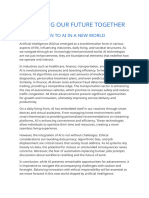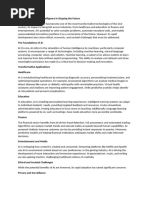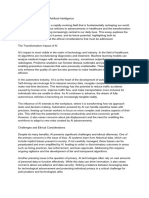0 ratings0% found this document useful (0 votes)
7 viewsmeet script
Uploaded by
Hoàng Nin LêCopyright
© © All Rights Reserved
Available Formats
Download as TXT, PDF, TXT or read online on Scribd
0 ratings0% found this document useful (0 votes)
7 viewsmeet script
Uploaded by
Hoàng Nin LêCopyright
© © All Rights Reserved
Available Formats
Download as TXT, PDF, TXT or read online on Scribd
You are on page 1/ 1
The Impact and Evolution of Artificial Intelligence in Modern Industries
Artificial Intelligence (AI) has emerged as a cornerstone of technological
innovation, profoundly influencing various industries and reshaping traditional
practices. Its rapid advancements have brought transformative changes in fields
such as healthcare, education, finance, and manufacturing, offering unprecedented
solutions to complex problems.
In healthcare, AI-powered systems are revolutionizing diagnostics and treatment.
Tools utilizing machine learning algorithms analyze vast datasets, such as medical
images and patient histories, to identify patterns indicative of diseases. For
instance, AI has demonstrated exceptional accuracy in detecting early signs of
conditions like cancer, heart disease, and diabetes, enabling earlier interventions
and improved patient outcomes. Robotic surgeries, guided by AI, are also becoming
more precise, minimizing human error and recovery times.
Education has likewise experienced a paradigm shift with AI-enabled technologies.
Adaptive learning platforms now tailor educational content to individual student
needs, analyzing performance metrics to provide personalized pathways. This
approach not only enhances engagement but also addresses learning gaps effectively.
Virtual tutors and AI chatbots offer real-time assistance, while data analytics
inform educators about classroom trends, enabling informed decision-making to
improve teaching methodologies.
The financial sector has also embraced AI to optimize operations and mitigate
risks. Fraud detection systems use AI to monitor transactions in real time,
identifying anomalies that indicate fraudulent behavior. Investment firms deploy
predictive analytics to forecast market trends, while customer service in banking
is increasingly driven by conversational AI, delivering quick, efficient support.
These applications reduce costs and enhance user experience, fostering trust and
reliability.
Manufacturing industries have benefited from AI-driven automation, streamlining
production lines and ensuring consistent quality. Predictive maintenance, powered
by AI, prevents equipment failures by analyzing operational data to identify
potential issues before they escalate. Moreover, AI applications in supply chain
management improve efficiency by forecasting demand, reducing waste, and optimizing
logistics.
Despite these advancements, the integration of AI is not without challenges.
Ethical concerns, such as bias in algorithms and the potential misuse of data,
remain significant issues. Additionally, the displacement of jobs due to automation
raises social and economic concerns that require strategic planning and workforce
reskilling. Governments and organizations must work collaboratively to establish
robust regulatory frameworks to address these challenges, ensuring that AI adoption
is both responsible and equitable.
As AI continues to evolve, its potential to drive innovation and efficiency is
boundless. However, realizing its full benefits requires a balanced approach that
considers technological advancements alongside societal implications. By fostering
interdisciplinary collaboration and ethical practices, we can unlock the
transformative power of AI to create a future that benefits all.
You might also like
- Lower Extremity Reconstruction Plastic Surgery100% (1)Lower Extremity Reconstruction Plastic Surgery65 pages
- Biology Investigatory Project: Name: Nasla Abdul Salam Class: 12-L School: Mes Indian School100% (1)Biology Investigatory Project: Name: Nasla Abdul Salam Class: 12-L School: Mes Indian School32 pages
- Congruence: The of Transparency: Hil H D and Oci Ty 2nd Edition100% (1)Congruence: The of Transparency: Hil H D and Oci Ty 2nd Edition6 pages
- The Impact of Artificial Intelligence on Modern SocietyNo ratings yetThe Impact of Artificial Intelligence on Modern Society2 pages
- The Impact of Artificial Intelligence On Modern SocietyNo ratings yetThe Impact of Artificial Intelligence On Modern Society2 pages
- The Influence of Artificial Intelligence On Modern SocietyNo ratings yetThe Influence of Artificial Intelligence On Modern Society1 page
- The Transformative Power of Artificial Intelligence in Modern SocietyNo ratings yetThe Transformative Power of Artificial Intelligence in Modern Society2 pages
- The Future of Artificial Intelligence and Its Impact on SocietyNo ratings yetThe Future of Artificial Intelligence and Its Impact on Society2 pages
- The Impact of Artificial Intelligence on SocietyNo ratings yetThe Impact of Artificial Intelligence on Society2 pages
- The Future of Artificial Intelligence - Opportunities and ChallengesNo ratings yetThe Future of Artificial Intelligence - Opportunities and Challenges6 pages
- The Impact of Artificial Intelligence on SocietyNo ratings yetThe Impact of Artificial Intelligence on Society3 pages
- The Impact of Artificial Intelligence On SocietyNo ratings yetThe Impact of Artificial Intelligence On Society2 pages
- The Impact of Artificial Intelligence on the WorldNo ratings yetThe Impact of Artificial Intelligence on the World3 pages
- The Role of Artificial Intelligence in Shaping the FutureNo ratings yetThe Role of Artificial Intelligence in Shaping the Future3 pages
- Artificial Intelligence and Its Societal ImpactNo ratings yetArtificial Intelligence and Its Societal Impact5 pages
- The Impact of Artificial Intelligence On Job MarketsNo ratings yetThe Impact of Artificial Intelligence On Job Markets2 pages
- The Impact of Artificial Intelligence on Modern Society100% (1)The Impact of Artificial Intelligence on Modern Society2 pages
- The Impact of Artificial Intelligence on Society and the Job MarketNo ratings yetThe Impact of Artificial Intelligence on Society and the Job Market9 pages
- The Impact of Artificial Intelligence on SocietyNo ratings yetThe Impact of Artificial Intelligence on Society2 pages
- The Impact of Artificial Intelligence On Job MarketsNo ratings yetThe Impact of Artificial Intelligence On Job Markets3 pages
- The Growing Role of AI and Its Repercussions in TodayNo ratings yetThe Growing Role of AI and Its Repercussions in Today5 pages
- The Promise of AI - Key Takeaways - CGCMNo ratings yetThe Promise of AI - Key Takeaways - CGCM2 pages
- Artificial Intelligence and Its Impact on Productivity Across Different IndustriesNo ratings yetArtificial Intelligence and Its Impact on Productivity Across Different Industries11 pages
- Recent advancements in the field of artificial intelligence have led to the development of machine learning algorithms capable of detecting patterns in large data sets with remarkable accuracyNo ratings yetRecent advancements in the field of artificial intelligence have led to the development of machine learning algorithms capable of detecting patterns in large data sets with remarkable accuracy1 page
- The Future of Artificial Intelligence Opportunities and ChallengesNo ratings yetThe Future of Artificial Intelligence Opportunities and Challenges3 pages
- The Impact of Artificial Intelligence on SocietyNo ratings yetThe Impact of Artificial Intelligence on Society1 page
- AI and Employment - Navigating The Future of WorkNo ratings yetAI and Employment - Navigating The Future of Work4 pages
- The Transformative Power of Artificial IntelligenceNo ratings yetThe Transformative Power of Artificial Intelligence3 pages
- The Impact of Artificial Intelligence On SocietyNo ratings yetThe Impact of Artificial Intelligence On Society3 pages
- The Evolution of Artificial IntelligenceNo ratings yetThe Evolution of Artificial Intelligence2 pages
- Unlocking Economic Potential - The Impact of AI InstitutionalizationNo ratings yetUnlocking Economic Potential - The Impact of AI Institutionalization6 pages
- Guide To Navigating Through Crisish by Crisis KrechNo ratings yetGuide To Navigating Through Crisish by Crisis Krech12 pages
- Peace Corps Monitoring, Reporting and Evaluating Specialist SoW MRENo ratings yetPeace Corps Monitoring, Reporting and Evaluating Specialist SoW MRE5 pages
- Kinesio Tape in Paediatric Physiotherapy A Content Analysis of Practitioner ExperienceNo ratings yetKinesio Tape in Paediatric Physiotherapy A Content Analysis of Practitioner Experience9 pages
- Hubungan Motivasi Deteksi Dini Kanker Serviks Dengan Tindakan Pap Smear Pada Wanita Usia Subur Di Wilayah GonilanNo ratings yetHubungan Motivasi Deteksi Dini Kanker Serviks Dengan Tindakan Pap Smear Pada Wanita Usia Subur Di Wilayah Gonilan7 pages
- The Ellis Family Edition: Volume 6 SampleNo ratings yetThe Ellis Family Edition: Volume 6 Sample10 pages
- Physical Activity During Pregnancy and Its Influence On Delivery Time: A Randomized Clinical TrialNo ratings yetPhysical Activity During Pregnancy and Its Influence On Delivery Time: A Randomized Clinical Trial14 pages
- Adherence To Sport Injury RehabilitationNo ratings yetAdherence To Sport Injury Rehabilitation11 pages
- Preparation and Quality Evaluation of Flour and Biscuit From Sweet PotatoNo ratings yetPreparation and Quality Evaluation of Flour and Biscuit From Sweet Potato6 pages
- PDF Dioxin Environmental Fate and Health Ecological Consequences 1st Edition Sudarshan Kurwadkar (Editor) Download100% (2)PDF Dioxin Environmental Fate and Health Ecological Consequences 1st Edition Sudarshan Kurwadkar (Editor) Download52 pages

























































































